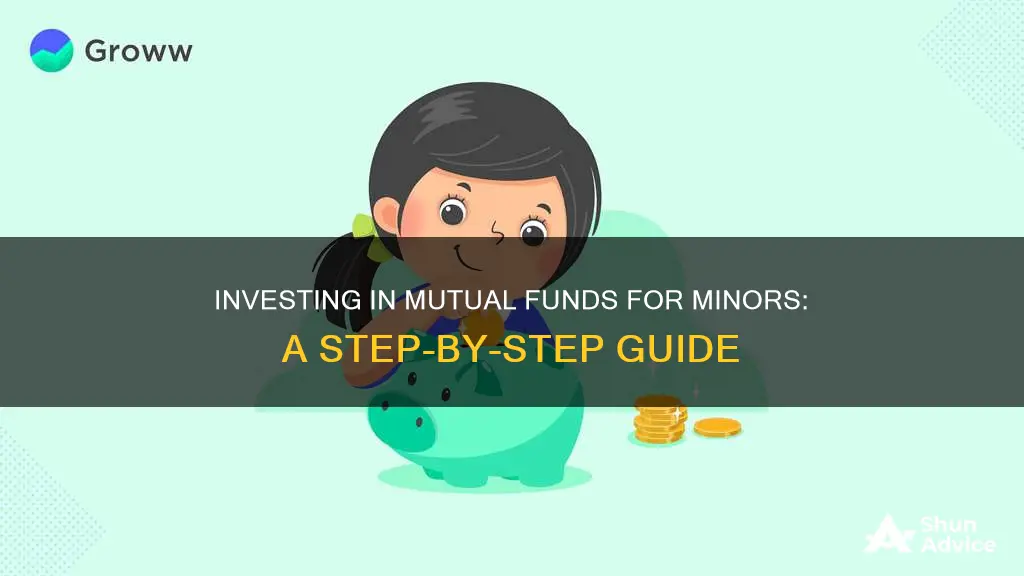
Investing in mutual funds is a great way to teach your child about money management and financial planning. In India, minors can invest in mutual funds with the assistance of their parents or legal guardians. The process of opening a minor account is simple and can be done online. It is important to note that the minor will be the sole holder of the account and that all investments must be made by the guardian from their bank account. When the minor reaches the age of maturity, usually 18 years, the account will be frozen until the necessary paperwork is completed to transfer ownership to the child. There are several benefits to investing in mutual funds, such as tax efficiency and the ability to save for specific goals. However, there are also some drawbacks, including the inability to hold joint accounts and the potential for the child to lack financial maturity when they gain access to the funds. Overall, investing in mutual funds for minors can be a great way to secure their financial future, but it is important to carefully consider the pros and cons before making any decisions.
What You'll Learn
- Minors can invest in mutual funds with guardian assistance
- The guardian must submit documents like a birth certificate, PAN card, and KYC
- The guardian makes all payments and receipts for investments
- Minors can invest in stocks, mutual funds, ETFs, and government bonds
- The account opened for the minor cannot be a joint account

Minors can invest in mutual funds with guardian assistance
Minors can invest in mutual funds with the help of a guardian. The minimum age to invest in mutual funds in India on one's own account is 18 years. However, there is no specification for a maximum age to invest money in mutual funds in India.
Documents required for a minor's investment in a mutual fund:
- Birth certificate
- Mark sheet
- Leaving certificate from the HSC board of respective states, ICSE, CBSE, etc.
- Minor's passport
- Date of birth proof
Points to keep in mind:
- All minor investments must have a specified "Guardian" responsible for managing the minor's investments.
- In most cases, the parents are natural guardians of a minor, but a court-appointed guardian would be required in other cases.
- A document that proves the relationship between the guardian and the child is essential.
- The guardian is required to submit all the necessary documents, such as bank details, Permanent Account Number (PAN), and complete Know-Your-Client (KYC) requirements.
- The guardian (from their bank account) will make all the payments and receipts for investments.
- Ownership of the investment, however, shall solely lie with the minor child.
- The account opened for the minor shall not be a joint account, and no nominees can be assigned to the account.
- The guardian of a minor account is liable to pay the taxes that are applicable to a minor account.
Mutual Funds: Where to Invest for Maximum Returns
You may want to see also

The guardian must submit documents like a birth certificate, PAN card, and KYC
When investing in mutual funds on behalf of a minor, the guardian must submit several important documents. These include a birth certificate, PAN card, and KYC acknowledgment or form. The birth certificate serves as proof of the minor's age and their relationship with the guardian. The PAN card, or Permanent Account Number, is necessary for tax-related purposes. The Know-Your-Client (KYC) requirements are also essential to complete the mutual fund investment process.
The birth certificate is a crucial document that verifies the minor's age. It can be substituted with other documents, such as a mark sheet, leaving certificate from the HSC board, ICSE, CBSE, or equivalent, the minor's passport, or any other valid proof of date of birth. This documentation ensures compliance with the Indian Majority Act, 1875, which defines a minor as an individual under 18 years of age.
The PAN card is another essential component of the application process. It is a unique identifier that enables the Income Tax Department to link all financial transactions to the individual. The PAN card is required for both the guardian and the minor. In the case of a change in the minor's guardian, a PAN card copy and KYC acknowledgment of the new guardian are necessary.
Additionally, the guardian must complete the Know-Your-Client (KYC) process. This involves submitting a KYC acknowledgment or a duly completed KYC form. The KYC process helps to verify the identity and other relevant details of the investor. It is a mandatory requirement for investing in mutual funds.
It is worth noting that the guardian must also provide additional documentation, such as bank details and proof of their relationship with the minor. These documents ensure that the minor's interests are protected and that the guardian has the necessary authority to manage the investments on their behalf.
Invest 529 Funds: Strategies for Maximizing College Savings
You may want to see also

The guardian makes all payments and receipts for investments
When investing in mutual funds on behalf of a minor, the guardian is required to make all payments and receipts for investments from their bank account. This is because minors are not considered able to make informed decisions about their finances.
The guardian will need to provide their bank details, as well as a Permanent Account Number (PAN) and complete Know-Your-Client (KYC) requirements. The guardian will also need to submit documents that prove their relationship with the minor, such as a birth certificate or passport.
It is important to note that while the guardian makes the payments and manages the investments, ownership of the investment shall solely lie with the minor. The account opened for the minor shall not be a joint account, and no nominees can be assigned to the account.
Once the minor reaches the age of majority (18 years), the account can no longer be operated by the guardian. The minor will need to submit their PAN and KYC details, and their signature will replace the guardian's in the investment account. All future transactions related to the investment will be made by the minor.
Strategic 401(k) Investing: A Guide to Growing Your Retirement Funds
You may want to see also

Minors can invest in stocks, mutual funds, ETFs, and government bonds
When investing in mutual funds, the minor must be the sole account holder, with a parent or guardian acting as the sole representative. The guardian has decision-making power over the account and can choose the mutual funds and alter investments. However, any money or assets contributed cannot be taken back. While the guardian typically has to be a parent, anyone can be designated to manage the investments, and there are no income restrictions. Anyone can make contributions to the account at any time. Once the child reaches the age of majority, they will need to change the status of the sole account holder from minor to major, or all transactions will be stopped. The tax implications will then need to be borne by the sole account holder, as with any investor above the age of 18.
Minors can also invest in stocks and ETFs through custodial accounts. ETFs, or exchange-traded funds, trade on exchanges like common stocks and can be a good option for investors due to their cost-effectiveness and liquidity. They are also subject to the same regulations as mutual funds in terms of what they can own and how much can be concentrated in a few holdings. ETFs tend to be cheaper to run than mutual funds and are passively managed, with buyers and sellers dealing directly with each other. Investors in ETFs only pay capital gains taxes when they sell shares, and there is no minimum holding period.
Government bonds are another investment option for minors, and these can be purchased through a custodial account. Government bonds are considered low-risk investments and can provide a guaranteed return. They are typically used for income generation or capital preservation and can be a good way to diversify a portfolio.
Hedging Mutual Fund Investments: Strategies for Risk Mitigation
You may want to see also

The account opened for the minor cannot be a joint account
When it comes to investing in mutual funds, minors (those under 18) can only have an account in their name if a parent or legal guardian opens it for them. The minor must be the sole holder of the account, and it cannot be a joint account with another person. This means that the minor's parent or legal guardian must act as the sole representative of the account. While this may seem restrictive, there are valid reasons for this rule.
Firstly, it is important to recognise that any income or capital gains from these investments in the minor's name are considered the child's income once they reach the age of maturity (18). This has tax implications, as the capital gains will be taxed according to the tax bracket of the parent or guardian while the child is a minor, and the child will be responsible for paying capital gains tax once they become an adult. If the account were a joint account, the tax liabilities could become complicated and disputed.
Secondly, when the minor reaches the age of maturity, the account ownership is transferred to them, and they gain full control over the investments and any transactions. If the account were a joint account, the minor would not have sole ownership and the ability to make independent decisions regarding their investments once they come of age.
Additionally, having a joint account could potentially impact the minor's financial future in other ways. For example, if the joint account holder were to go through a divorce, their spouse could claim a portion of the jointly held account as part of the divorce settlement. This could result in the minor losing a significant portion of their investments through no fault of their own.
While it may be tempting to want to have joint ownership of a minor's mutual fund account, it is important to recognise that this is not allowed and there are valid reasons for this restriction. It is crucial to follow the proper procedures and regulations when investing on behalf of a minor to ensure their financial future is protected and to avoid any legal or tax complications.
Actively Managed Funds: Where to Invest Your Money?
You may want to see also
Frequently asked questions
Yes, a minor can invest in Mutual Funds with the assistance of their parents or legal guardians. All Mutual Fund companies allow investments to be made on behalf of a minor child.
Investing in a minor's name enables you to establish a specific allocation for a particular purpose, such as funding a child's higher education. It can also help you become more motivated to prioritise financial goals for your child. Additionally, it increases the child's awareness of financial responsibilities and can help them develop good saving habits. Lastly, long-term mutual fund investments will improve the taxpayer's tax efficiency.
One key point to consider is that the possession of these investments is transferred to the child once they reach the age of maturity (18 years). At this point, the account is frozen until the necessary paperwork is in place to transfer ownership, including the right for the child to make investments or withdrawals. Additionally, passing a large sum of money to an 18-year-old may not always be advisable, as they may lack the maturity to handle it properly.
The following documents are typically required:
- Authentic evidence of the child's age, such as a birth certificate, passport, or other proof of date of birth.
- Proof of the child's relationship with the guardian, such as a birth certificate or passport.
- Documents for the guardian, including bank details, Permanent Account Number (PAN), and Know-Your-Client (KYC) requirements.
The account opened for the minor shall not be a joint account, and no nominees can be assigned to the account. The minor shall be the sole holder. Additionally, the guardian is responsible for making all payments and receipts for investments from their bank account. Intraday and F&O trading are also not allowed in minor accounts.







